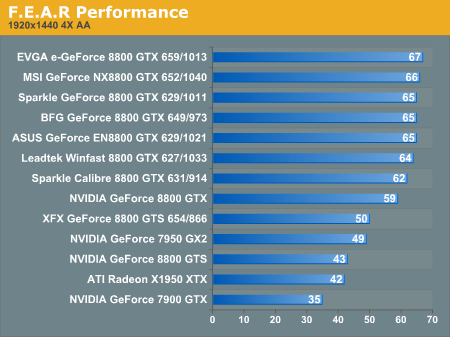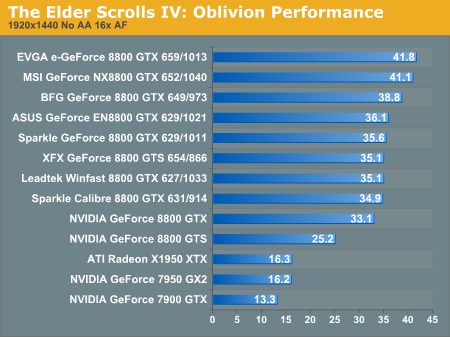GeForce 8800 Roundup: The Best of the Best
by Josh Venning on November 13, 2006 11:04 AM EST- Posted in
- GPUs
Overclocked Performance
Once we achieved our overclocks for these cards, we wanted to see what kind of performance gains we would see with the higher clock speeds. Our test system was the same one we used for the 8800 launch tests:
| CPU: | Intel Core 2 Extreme X6800 (2.93GHz/4MB) |
| Motherboard: | EVGA nForce 680i SLI Intel BadAxe |
| Chipset: | NVIDIA nForce 680i SLI Intel 975X |
| Chipset Drivers: | Intel 7.2.2.1007 (Intel) NVIDIA nForce 9.35 |
| Hard Disk: | Seagate 7200.7 160GB SATA |
| Memory: | Corsair XMS2 DDR2-800 4-4-4-12 (1GB x 2) |
| Video Card: | Various |
| Video Drivers: | ATI Catalyst 6.10 NVIDIA ForceWare 96.97 NVIDIA ForceWare 91.47 (G70 SLI) |
| Desktop Resolution: | 2560 x 1600 - 32-bit @ 60Hz |
| OS: | Windows XP Professional SP2 |
We tested the performance of these cards with two games at the same settings as our performance tests in the 8800 launch article to keep things consistent. The two games we chose for performance testing are F.E.A.R and Oblivion. We tested both games at 1920x1440 resolution, with 4xAA for F.E.A.R, and no AA/16xAF for Oblivion. Our settings for Oblivion were the same as those in our 8800 launch tests, with all quality settings on or at their highest and with HDR enabled. In F.E.A.R. we put all quality settings at their highest, with the exception of the "soft shadows" option, which we feel creates too much of a performance hit given the poor effect it creates.


In F.E.A.R. with the overclock on the XFX 8800 GTS we see about a 16% boost in performance at 1920x1440. In Oblivion we see almost a 40% increase in performance with the overclocked XFX 8800 GTS. Among the 8800 GTX cards, we see that as we would expect the MSI and EVGA samples saw some of the best performance with their overclocks.
In F.E.A.R we see increases in performance of about 14%, and in Oblivion, increases of around 26% between the factory clocked and user-overclocked cards. Keep in mind that with Oblivion, there is some variance (< 5%) in the frame rate between benchmarks because it is a manual run-through of a save game using FRAPS.










34 Comments
View All Comments
peternelson - Saturday, November 25, 2006 - link
I'm hearing rumours of an even never "dual" type card called 8850gx2.
Anandtech can you reveal any news on this?
at80eighty - Wednesday, November 22, 2006 - link
Annual Computernerd Wanfest of 2006 just rolled into town (im a wanking nerd btw :-p)what i saw in the papers was an ad for an XFX 8800 GTX. but this article doesnt mention it's existence (or i missed it)
or did you pick he GTS as it was a better deal than the GTX?
Modular - Saturday, November 18, 2006 - link
I was just wondering why there are no charts showing the core temps when the cards were overclocked. I'd be interested to see how much more heat these things crank out @ faster speeds. I also heard that they no longet throttle the GPU core when in 2D mode. That seems silly to me as it probably is a huge reason for the high idle power draw as well as the high idle core temps...dpante1s - Wednesday, November 22, 2006 - link
Would be very interesting to see a roundup just for the 8800 GTS cards as I think that many users may only afford to buy this one but would like to know which one of those is the best for overclocking...crystal clear - Tuesday, November 14, 2006 - link
More GeForce G80 Series RevealedPublished on November 13th, 2006
http://www.ngohq.com/home.php?page=Articles&go...">http://www.ngohq.com/home.php?page=Articles&go...
G80-200, G80-400, G80-600,G80-850, G80-875
AnnonymousCoward - Monday, November 13, 2006 - link
I believe your overclocking results are horribly flawed and misleading. The max core clock varies with each semiconductor part, so you can't just take 8 cards from different companies and determine which company overclocks the best! They all got different G80 dies.Now, cooling could affect the overclock amount. But based on the cooling results, there's no correlation. Look at Sparkle's poor overclock versus its great cooling, as well as EVGA's and MSI's great overclocking versus heat. No correlation.
At least Page 5 said "Whether the overclocks we reached are due to variability in cores or..." But Page 8 showed more misunderstanding with "The temperature levels of this card under load are even lower than the XFX 8800 GTS by over ten degrees. This is somewhat perplexing considering that our Sparkle Calibre 8800 GTX sample didn't overclock very well compared to the other 8800 GTXs."
The conclusion should have been "8800GTX's overclock between 627-659MHz", and don't bold the one in the table from the company that happened to get the best die.
shamgar03 - Wednesday, November 15, 2006 - link
I concur, unless the author can present more evidence?cryptonomicon - Monday, November 13, 2006 - link
They're valueable to me :(Would love if they every got included on vid card roundups like these...
shank15217 - Monday, November 13, 2006 - link
the new nvidia cards are doing great but just take a look at the older 7 series and compare it to the ATI offering. ATI 1950XTX hands the geforce 7 series its butt. I have a strange feeling the R600 will give Nvidia a run for its money.xsilver - Monday, November 13, 2006 - link
i found it interesting that on one of your graphs that the overclocked GTS is able to noticibly beat the GTXwould it be possible at a more sane 1600x1200 resolution?